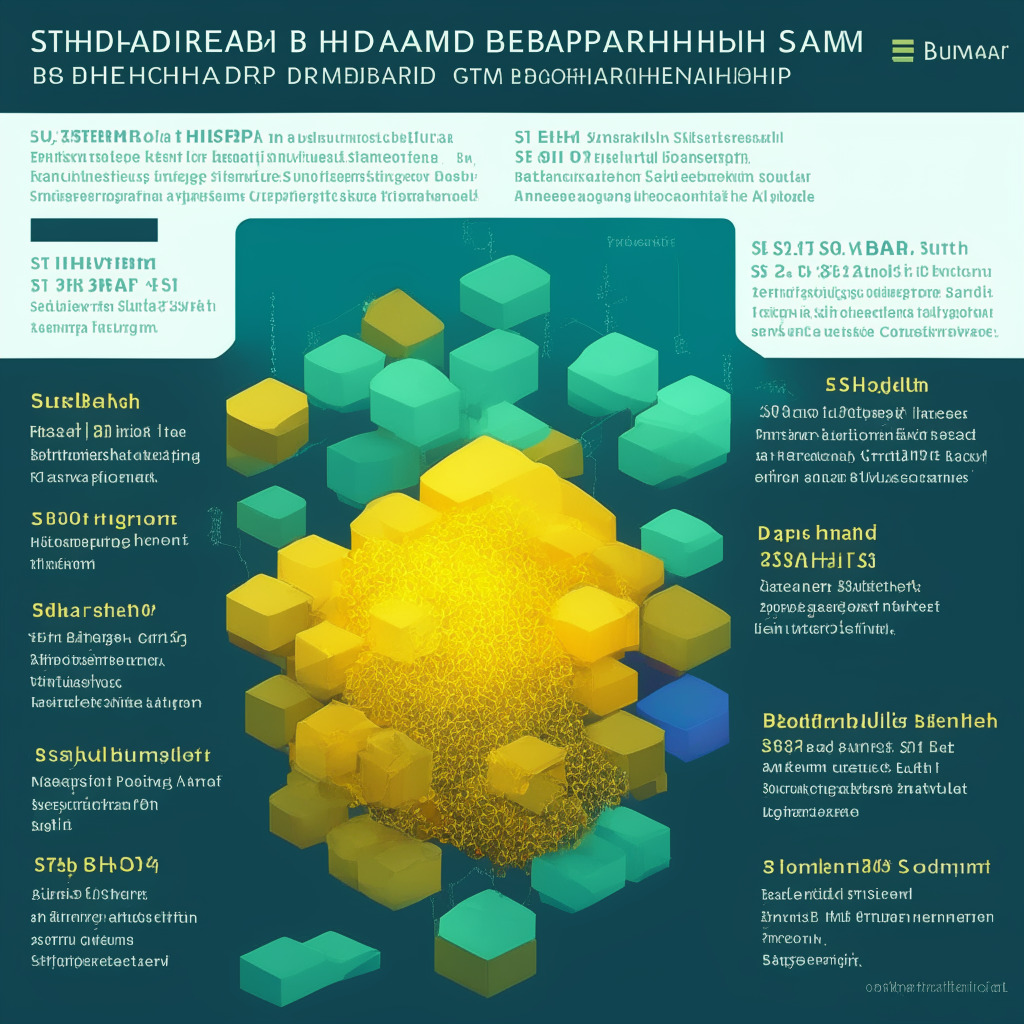“The cryptosphere is witnessing a drop in prices of major coins, especially SUI and HBAR due to an expected increase in circulating supply. This token unlock event – a strategy to alleviate selling pressure from early investors and project team members, could cause market fluctuations. However, these short-term shifts should not disconcert investors as smart strategizing can turn such events into opportunities.”
Search Results for: Token Unlocks
Impact of Token Unlocks on Market Price: A Breakdown of Recent Release Events for LDO, AVAX and YGG
Lido (LDO), Avalanche Blockchain token (AVAX), and Yield Guild Games DAO token (YGG) will experience substantial token unlock events this week, signaling a potential surge in market token supply. LDO plans to unfreeze 8.5 million tokens, while AVAX and YGG are set to release 9.54 million and 12.2 million tokens respectively. This highlights both the promise and complexity of unlock events’ impact on market trends.
Unveiling the Mystery of Aptos Token Unlocks: A Boon or a Bane for the Market?
Aptos blockchain’s upcoming unlock of more than 2% of the APT token’s circulating supply could potentially lead to a significant drop in its value, based on data from TokenUnlocks. Traditionally, these unlocks often correlate with asset price decreases as investors preemptively sell their holdings before additional tokens saturate the market. This impending event continues to draw attention from crypto enthusiasts.
Optimism Navigates Through Financial Headwinds Ahead of Major Token Unlock
“Ethereum layer 2 network, Optimism, faces a financial downturn as its token, OP has dropped almost 10% in the run-up to its planned token unlock on September 30. This downward trajectory in prices reflects the increased supply’s impact on asset value.”
Impending Token Unlock for Optimism: A Balance of Growth and Uncertainty
The Ethereum layer 2 network, Optimism, anticipates a token unlock on September 30, posing some uncertainty for its native token. This unlock involves unwrapping 24.16 million tokens (around $31.1 million), representing a 3% sliver of total circulating supply. Preluding the unlock, Optimism announces a release of 570 million tokens for future airdrops, with allocations based on community participation and governance votes.
Unveiling Aptos’ $103 Million Token Unlock: A Risky Affair or Lucrative Opportunity?
The article discusses the blockchain protocol Aptos’s plan to release 20 million APT tokens in November – a move that could inject substantial liquidity into the market. However, data indicates a potentially bearish outlook for APT, suggesting traders exercise caution and closely observe market trends.
Aptos Unleashes 20 Million Tokens: The Potential Market Impact Explained
Former Facebook staff’s Layer 1 protocol, Aptos, is set to unlock 20 million tokens in November, representing an 8.5% of total supply. This could significantly impact the crypto market by increasing liquidity and potentially stirring varied price dynamics.
Unlocking the Potential: SAND Token Embraces Market Flood and Its Impacts
Metaverse platform, Sandbox’s native currency, the SAND token, is set for an unlocking period starting from Monday, releasing 332 million tokens, or over 16% of the circulating supply into the open market. Despite potential bearish trends, this gives token holders their first opportunity to sell positions.
Unraveling the Dynamics of Optimism’s Upcoming Token Release: Impact and Resiliency in Flux
Layer-2 blockchain, Optimism, is set to release $36 million worth of tokens, a move that previously triggered a temporary price decrease in its OP token. Despite initial fluctuations, year-to-date performance established a strong 67% growth, with operational decisions offering dynamic investment evaluations.
Unlocking OP Tokens: Doom or Boom for Optimism’s Future amid Bedrock Upgrade and Low Liquidity
The recent unlocking of 114% of Optimism’s previous circulating supply led to a near 50% decline in its OP token’s value. Despite this, upcoming events like the Bedrock upgrade and projects like Worldcoin and Coinbase’s Base testnet building on the OP stack indicate a more optimistic outlook for the Ethereum layer-2 solution.
Massive Optimism Token Unlock: Evaluating Market Impact and Future Prospects
The upcoming unlocking of 386 million Optimism (OP) tokens, worth $587 million, on May 31 raises concerns of downward price pressure due to the potential 100% increase in circulating supply. Early-stage investors, including Paradigm and IDEO, currently hold 10,000% gains, which may contribute to significant sell pressure on the OP token.
Wintermute Dumps Optimism Tokens: Upcoming Unlock’s Impact on OP Price & Market Resilience
Cryptocurrency enthusiasts may be concerned about Wintermute Trading dumping millions worth of Optimism tokens ahead of a major unlock event on June 1. This development could affect OP’s price, but market response to such events remains unpredictable, urging caution amid varying opinions.
Ethereum Anonymity Boost: Andreessen Horowitz’s Cicada Library Unlocks Anonymous Voting Pros and Cons
Andreessen Horowitz’s venture capital fund has released Cicada, a Solidity library that significantly advances anonymous voting on the Ethereum platform by preventing individual voter choices from being disclosed before polling ends. Combining Cicada with zero-knowledge group membership systems enhances voter anonymity, while addressing challenges in encoding blockchain votes, paving the way for more democratic voting systems within decentralized autonomous organizations (DAOs).
Unveiling the Avalanche: Analyzing the Impact of 9.3 Million Unlocked AVAX Tokens
The Avalanche blockchain ecosystem is anticipating a 1.2% increase in total supply as 9.3 million AVAX tokens, worth around $130 million, will be unlocked and distributed on May 27. The recipients include the Avalanche Foundation, Ava Labs, strategic partners, and an airdrop. Despite initial concerns among investors, this upcoming token unlock has been mapped out, and its impact on the market remains to be seen.
Tokenization Trend Booms: $220M Market Cap, DeFi Integration, and Regulatory Challenges
Tokenization of financial securities on the blockchain is gaining momentum, with a market cap of over $220 million. Firms like Matrixport, Backed Finance, Ondo, and Franklin Templeton create tokenized government bonds and ETFs, predominantly on Ethereum. This trend enables new opportunities, improved lending efficiency, and promises innovation in finance; however, it requires a supportive regulatory landscape to reach its potential.
Impact of $1.2 Billion HBAR Token Unlock: Analyzing Bearish Outcomes and Hedera’s Resilience
Approximately $1.2 billion worth of HBAR tokens are set to be released on June 1, unlocking 2.54% of the cryptocurrency’s total supply. Despite token unlocks typically signaling bearish outcomes, Hedera’s multiple past unlocks may reduce selling pressure and lessen the impact on HBAR’s price.
Meme Coin Rally Falters: Examining PEPE’s Decline and the Impact of Token Allocations
The meme coin rally, including Pepecoin (PEPE), appears to be losing momentum as PEPE’s value drops 11%. Despite this, the coin experienced a 215% increase over the past week. Factors like market makers’ token allocation and selling pressures raise concerns for investors, highlighting the need for caution and awareness of potential risks.
Unlocking the Sandbox: Tensions Between Crypto’s Decentralization Ethos and Mainstream Adoption
The Sandbox Metaverse project recently unlocked $133M worth of its native SAND tokens, increasing its circulating supply. However, such token unlocks often cause a downward trend in prices due to increased market liquidity. Meanwhile, The Sandbox is also focused on expanding its metaverse ecosystem, recently partnering with the British Museum. Concurrently, the US Federal Reserve’s instant payment system, FedNow, included a Hedera-based micropayments platform called Dropp, reflecting gradual acceptance of DLTs.
FTX’s Potential Liquidation and the Recoil it Provokes: Navigating Market Uncertainties
This excerpt gives an overview of the recent market fluctuations triggered by FTX’s potential liquidation of crypto holdings, featuring significant stakes in Bitcoin and Solana. Despite the panic, experts argue that this anticipated chaos may have been overhyped, with sales likely to be gradual and strategic.
Unleashing the Billion-Dollar Beast: Arbitrum’s Unlocking Future and its Impact on Crypto Markets
“Arbitrum plans to unfreeze more than $1 billion worth of its ARB tokens, marking the beginning of a four-year period of staggered token releases. This ‘cliff unlock’ strategy unfreezes a set percentage of tokens, injecting liquidity into the system. However, the impact on ARB’s future value remains uncertain, underscoring the unpredictability of the crypto realm.”
Measuring L1 Blockchain Viability: The Shift from Traditional Metrics to YTP Analysis
The article discusses the importance of assessing layer-1 blockchains profitability using a Years-to-Profitability (YTP) ratio method. It highlights the role of emissions schedule and tokenomics in projecting future costs. Furthermore, the article stresses the value of YTP as a tool in measuring a blockchain’s profitability and sustainability, particularly in relation to burn mechanisms and supply dynamics.
Ethereum’s Future: Will Locked ETH Boost Price or Vulnerability Cause a Dip?
Binance CEO CZ expressed bullish outlook on Ethereum (ETH) price amid staking activities reaching new heights and locked ETH on the Beacon Chain at an all-time high. However, ETH price still trades below $1,850 and faces the risk of falling further despite CZ’s optimism.
Bankruptcy Court Approves Liquidation of FTX: A Resilient Crypto Market or a Fall From Grace?
The United States Bankruptcy Court approved the phased liquidation of FTX’s nearly $3.4 billion crypto assets inciting a general sigh of relief among creditors. The carefully planned $7.1 billion liquidation of assets notably Solana and Bitcoin aims to maintain market stability, counter potential market fluctuations, and safeguard the wider crypto market.
Sushi’s Blockchain Leap: Breaking Boundaries or Overextending its Reach?
Decentralized exchange Sushi is extending its services to non-Ethereum Virtual Machine compatible blockchain, Aptos, marking a major development. This strategic move could potentially attract fresh capital towards Aptos while enhancing cross-chain trading experiences and opening up new possibilities for liquidity across major blockchain networks.
Unraveling Reddit’s Bold NFT Strategy: Sweeping User Adoption or Risky Leap into Blockchain?
“Reddit’s strategy for onboarding users to its blockchain-based digital collectibles involves an easy-to-use wallet, “Reddit Vault,” and prioritizing the product’s benefits over the underlying technology. However, rapid adoption raises questions around user understanding and protection in the blockchain world.”
The Phygital Revolution: Bridging the Gap Between Fashion, Music, and Blockchain Technology
“Blockchain and digital assets company, Legitimate, has partnered with PUMA and Roc Nation to develop an exclusive sneaker collection that merges music, fashion, and blockchain technology. Their ‘phygital’ approach also incorporates NFC chips to deliver unique content and foster strong bonds between brands and customers.”
Ethereum’s Shanghai Upgrade: Unleashing Staked ETH and its Potential Consequences
The Ethereum network’s recent Shanghai upgrade enables validators to withdraw staked Ether (ETH), reducing gas fees and unlocking validator withdrawals. This upgrade impacts Ethereum app developers and users, enhancing blockchain functionality and potentially influencing institutional adoption of cryptocurrencies. The change may affect the number of network validators and ETH prices, depending on their decisions to unstake or invest further.
Meme Coins Enter Politics: Wojak, Pepe, Copium, and Generational Wealth Controversies
Meme coins like Wojak ($WOJAK), Pepe ($PEPE), Copium ($COPIUM), and Generational Wealth ($GEN) are generating strong political reactions and tapping into the potential to create generational wealth. As these projects delve into the political landscape, their enormous potential attracts early investors, becoming an onboarding sub-sector in the crypto space.
NYC Blockchain Hub: Innovating Amidst Pros, Cons, and Conflicting Views
In the heart of New York City lies an epicenter for blockchain technology and crypto markets, fostering innovation and groundbreaking developments. The digital ledger’s security, transparency, and seamless integration with various industries are significant benefits. However, the technology faces challenges like lack of regulation, scalability issues, and energy consumption concerns. Events and conferences in locations like 133 W 19th St. play a crucial role in building a thriving blockchain community, shaping the future of finance and technology.
Ethereum Trading Contest at ProBit Global: Win Big in the 5,000 USDT Prize Pool
ProBit Global adds Ethereum to its trading competition series, coinciding with the successful completion of the Shapella upgrade. Users can win rewards based on trading volume, with a total prize pool of 5,000 USDT available. This competition aims to boost interest in Ethereum as the network evolves.
Massive XRP Unlock: Ripple’s Expanding Ecosystem or Market Manipulation Risk?
A staggering 500 million XRP, equivalent to $234.8 million, were unlocked from escrow today, causing […]






























